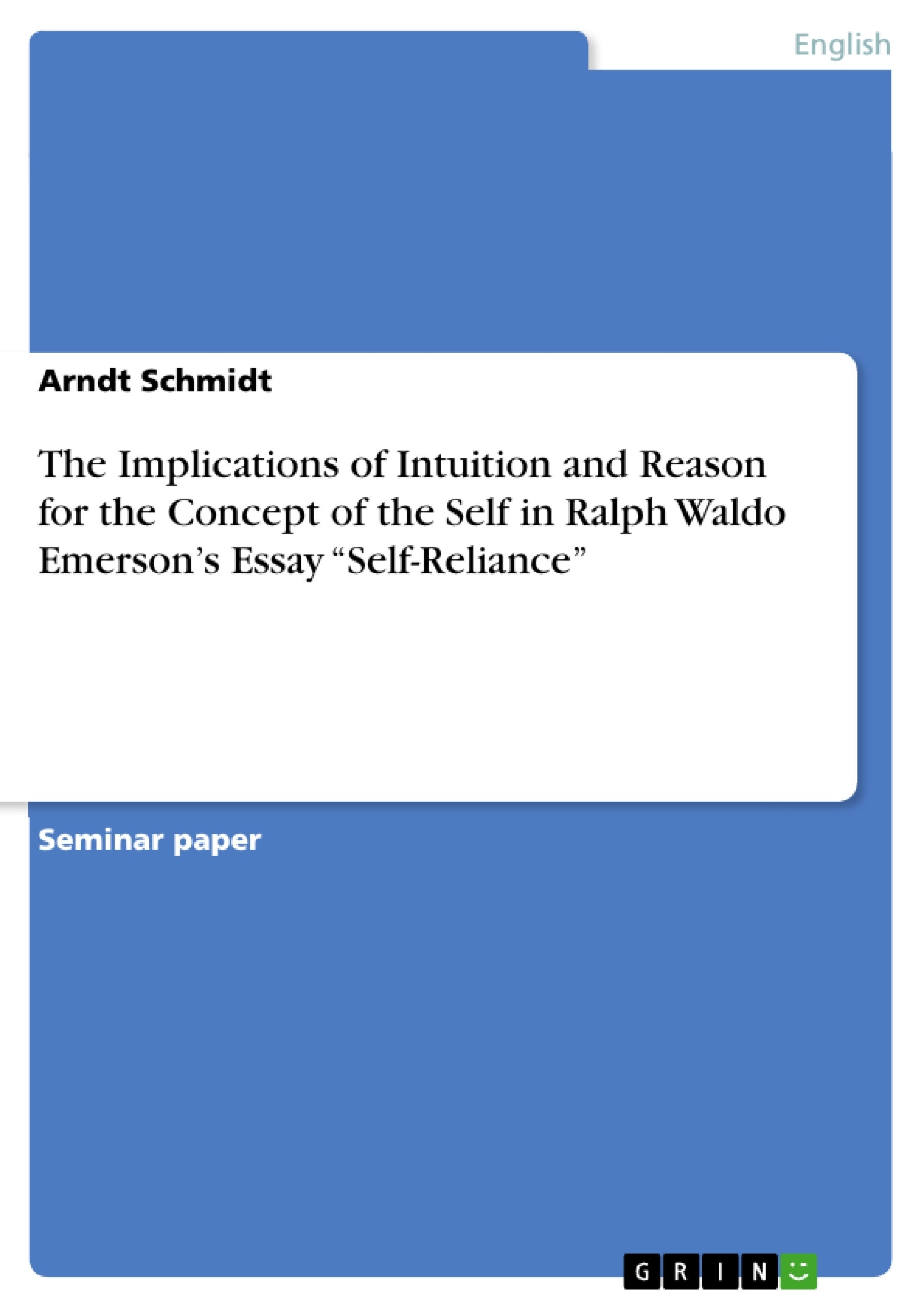The essay “Self-Reliance” occupies a central place not only in Ralph Waldo Emerson’s collection “Essays, First Series”, but in all of his writings and his thinking. On account of that it is often the first (or only) work by Emerson which many readers encounter. Having published “Nature” before, he himself described it as “an entering wedge (…) for something more worthy and significant” (cf. Porte, p.106). With his “Essays, First Series” then, Ralph Waldo Emerson once and for all established himself as a writer. Moreover, he found his most important subjects and style of writing as well as putting down his basic philosophical assumptions (cf. Van Leer, p.100 f).
Even without prior knowledge of most of Emerson’s other writings, Self-Reliance might offer a key to his thinking in general. The concept of the Self that Emerson outlines in this essay seems to be the pivot around which his view of Man revolves. Therefore, I would like to investigate this concept and its underlying attitude towards intuition and reason as far as it becomes apparent in Self-Reliance.
Table of Contents
- The Implications of Intuition and Reason for the Concept of the Self in Ralph Waldo Emerson's Essay "Self-Reliance"
- Emerson and Transcendentalism
- The Concept of "Spontaneity"
- Intuition and the Beauty of Nature
- Intuition and Reason as Necessary Means
Objectives and Key Themes
This essay explores the concept of the self in Ralph Waldo Emerson's essay "Self-Reliance" with a particular focus on the relationship between intuition and reason. The essay aims to analyze how Emerson's views on these two concepts influenced his understanding of human nature and societal development.- The significance of "Self-Reliance" in Emerson's work and the development of Transcendentalism
- The role of intuition in shaping the self and its connection to a higher truth
- The limitations of reason and the need for a balance between intuition and reason
- The relationship between individual development and societal structures
- The importance of recognizing and embracing one's authentic self
Chapter Summaries
This essay examines the complex interplay between intuition and reason as they relate to the concept of the self in Ralph Waldo Emerson's "Self-Reliance." The author begins by discussing Emerson's place within the context of Transcendentalism, noting its origins in the reaction against the emphasis on emotionalism in the Great Awakening. The essay then delves into Emerson's concept of "Spontaneity" as the source of true genius, virtue, and life. This "Spontaneity" is presented as an innate quality that cannot be fully defined by reason. However, while Emerson emphasizes the importance of intuition, he also recognizes the need for a rational understanding of its implications. The essay concludes by highlighting how Emerson sees both intuition and reason as essential for the development of the self.Keywords
This essay focuses on the themes of intuition, reason, self, authenticity, individuality, Transcendentalism, and "Self-Reliance." The exploration of these keywords within the context of Ralph Waldo Emerson's essay reveals his unique perspective on human nature, societal structures, and the importance of embracing one's true self.Frequently Asked Questions
What is the core theme of Ralph Waldo Emerson's essay "Self-Reliance"?
The core theme is the importance of individual authenticity and trust in one's own intuition over the pressures of social conformity and traditional structures.
How does Emerson view the relationship between intuition and reason?
Emerson prioritizes intuition (or "Spontaneity") as the source of true wisdom and virtue, though he acknowledges that reason is necessary to understand and apply these intuitive insights.
What is "Transcendentalism" in the context of this essay?
Transcendentalism is a philosophical movement that emphasizes the inherent goodness of people and nature, believing that society and its institutions often corrupt the purity of the individual.
What does Emerson mean by "Spontaneity"?
He refers to an innate, divine quality within the individual that provides direct access to truth and creative genius, which cannot be fully captured by logical reasoning alone.
Why is "Self-Reliance" considered a key work in American literature?
It established Emerson as a major philosopher and writer, laying out the basic assumptions of American individualism that influenced generations of thinkers and writers.
- Quote paper
- Arndt Schmidt (Author), 2007, The Implications of Intuition and Reason for the Concept of the Self in Ralph Waldo Emerson’s Essay “Self-Reliance”, Munich, GRIN Verlag, https://www.grin.com/document/189031



